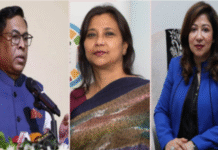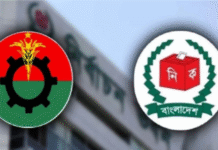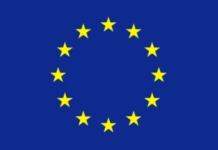Ruling Awami League MP Abdur Rahman Badi, already accused of controlling Yaba trade in Cox’s Bazar, has now been identified as one of the people assisting Rohingyas to illegally become voters in Bangladesh.
The Prime Minister’s Office (PMO) itself named him in a recent report and has directed the Election Commission (EC) to take measures.
Regarding the confidential report sent to the EC in October, Election Commissioner Md Shah Nawaz on Sunday told bdnews24.com: “Directives to take measures based on the PMO’s report has already been given.”

Earlier, a list prepared by the Department of Narcotics Control (DNC) and released in January named Cox’s Bazar-4 (Teknaf-Ukhia) MP Badi as the person in control of the principal point of entry through the border for illegal club-drug Yaba.
Apart from naming 10 people including his brother, several in-laws, uncle and nephew, the DNC list said many others work under Badi in the illegal drug trade.
In October, he was sent to prison over a case of concealment of wealth filed by the Anti Corruption Commission (ACC).
Badi, awarded by the government for paying the highest amount of income tax this year, has been rejecting all the charges levelled against him.
His involvement in assisting the Rohingyas of Teknaf and Ukhia to become Bangladeshi voters has come to light nearly a month after he secured bail in the ACC case and stepped out of jail.
Apart from Badi, the PMO report says Teknaf Upazila Parishad Chairman Zafar Ahmed and many representatives of local Union Parishads were also helping the Rohingyas to become voters.
bdnews24.com has obtained a copy of the report, signed and sent by PMO Director Mohammad Mukhlesur Rahman Sarker, which names 51 people including public representatives and election officials who are assisting the Rohingyas.
According to the report, Badi and 45 others are from Cox’s Bazar and another five including Upazila election officer Md Mainul Hoque are from Bandarban.
Actions against these listed ones and over 400 Rohingyas, 389 of whom from Cox’s Bazar are already voters, have been recommended.
The list contains the names, addresses, National ID numbers of these Rohingyas and names of the people who helped them to become voters. Another 51 Rohingyas of Bandarban are also enlisted as people who want to become voters.
Commissioner Shah Nawaz said these Rohingyas would be excluded before the voter list is finalised and published.
EC Senior Assistant Secretary Mahfuza Akter told bdnews24.com that they had already sent out directives along with the report to the local administrations to take measures against the listed people.
She said deputy commissioners and chief election officials of both districts and Upazila election officers had been ordered to conduct investigations and take actions.
Exclusion from voter list aside, one can face six months to one year in prison and fine for registering with false information, negligence and assisting fake voters to illegally get enlisted.
However, EC officials said it would have been much effective if the PMO had asked the Speaker of the Parliament and the Ministry of Local Government, Rural Development and Co-operatives to take legal measures against the MP and local administration representatives.
Facing repression and torture by the military government of Myanmar, Muslim Rohingya people had started crossing over into Bangladesh over two decades ago. The number of Rohingyas living in Bangladesh both illegally and as refugees has already crossed 500,000.
The Election Commission had started its initiatives against inclusion of Rohingyas in the voter list following reports as the government became more concerned over their involvement in crimes.
The EC is currently updating the voter list which would be finalised and published on Jan 31 next year.
It had cancelled over 6.5 million registrations in two phases since the voter list was prepared for Bangladeshi citizens in 2008.
Currently, there are over 92 million voters in the country.
Strategies Rohingyas are using
The PMO report also mentioned the strategies Rohingyas were using to become voters using illegitimate means.
It said after crossing the border Rohingyas start living at either slums near the coast or at relatives’ house or rent houses or flats.
After spending months or years there, they take possession of lands with assistance from local administration representatives or influential people and start living there.
Then they obtain the certificate of citizenship or birth certificate by bribing local Union Parishad members or chairman to be on the voter list.
Rohingyas also pass local families off as parents or relatives and use those people’s identity to get any of the two certificates in order to become a voter.
The report also said Rohingyas had another tendency to use false addresses and move to another place to live permanently.
Source: bdnews24









